
Newsroom
International Training Workshop on Karst Aquatic Ecosystems and Carbon Cycling along the Belt and Road Initiative
From April 20th to 22nd, the Institute of Hydrobiology (IHB) of Chinese Academy of Sciences, hosted an international training workshop on Karst Aquatic Ecosystems and Carbon Cycling along the Belt and Road Initiative. Forty-six participants from more than 20 countries including China, Serbia, Indonesia, Croatia, and Slovenia attended the training.
At the opening ceremony, vice director XU Jun from the IHB, director WANG Liangwei from the Wuhan Branch of the Chinese Academy of Sciences, and deputy secretary-general LUO Qukan from the International Research Center on Karst under UNESCO delivered speeches. As the initiator of this international training workshop and associate professor of the IHB, WANG Pei presided over the opening ceremony and was responsible for coordinating indoor lectures and field practice sessions.
The international training workshop invited seven lecturers including Professor WU Zhenbin, Prof. ZHANG E, Prof. BI Yonghong, Prof. QIU Dongru from the IHB, Prof. LI Siyue from Wuhan Engineering University, and Prof. GAO Xubo from China University of Geosciences (Wuhan) to give indoor lectures on topics such as "Constructed Wetland and Aquatic Ecological Restoration in China," "On 'One Belt and One Road'—Species Exploration of Freshwater Fishes," "Algae in Karst Area," "Carbon Cycle: Aquatic Dissolved Organic (DOM) and Carbon Emission," "Geobiome: Bacterial Metabolisms, Floc-Formation of Activated Sludge and Municipal Sewage and Industrial Wastewater Treatment," "Karst Water Flow System and Pollution," and "Karst Aquatic Ecosystem and Carbon Cycle." Additionally, nine participants from Morocco, Indonesia, Iran, Jamaica, Libya, Slovakia, and Thailand shared typical cases of research on water resources, water environment, and aquatic ecology in karst areas in their respective countries.
During the field practice, associate professor WANG Pei, took Wuhan East Lake as an example to introduce the important role of primary producers represented by algae and submerged plants in stabilizing karst carbon sinks in karst aquatic ecosystems. He also discussed the impact of eutrophication on the succession of submerged plant communities and the carbon sequestration potential in eutrophic lakes ecological restoration projects.
Throughout the training, participants visited the Aquatic Biota Museum and Baiji Dolphin Museum. Associate professor HAO Yujiang gave a presentation on the progress and insights into the conservation of the Yangtze finless porpoise. Additionally, participants visited the Hubei Provincial Museum to experience the profound Chu culture with a history of 800 years.
This workshop is part of the United Nations Educational, Scientific and Cultural Organization (UNESCO) International Karst Training Program (14 days, held in Beijing, Wuhan, and Guilin) and the China-Slovenia (China-Central and Eastern European Countries) Karst Science and Technology Innovation Cooperation Half-Month Tour (listed as one of the main activities of the Zhongguancun Forum), with strong support from the China Science and Technology Exchange Center, the International Karst Research Center of UNESCO, and the Institute of Karst Geology, Chinese Academy of Geological Sciences, as well as the Special Support of the Chinese Academy of Sciences Future Partners Network Project "Karst Aquatic Ecosystem Inert Dissolved Organic Carbon Source Analysis (Project No.: 075GJHZ2023030FN)".
Through the UNESCO International Karst Research Center, this international training workshop disseminated the latest scientific research achievements in the field of karst aquatic ecosystems and carbon cycling to karst countries along the Belt and Road, enhancing extensive exchanges and pragmatic cooperation among karst scholars from participating countries. This initiative aims to establish international cooperative comparative research among karst countries along the Belt and Road, enhance human capacity to cope with the loss of aquatic biodiversity in karst areas under the background of global climate change, and contribute to the realization of the United Nations 2030 Sustainable Development Goals.
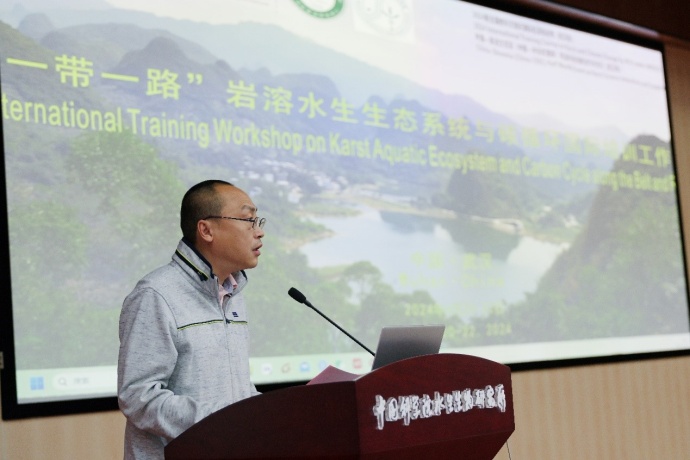
Vice director XU Jun from the IHB delivered a speech (Credit: IHB)
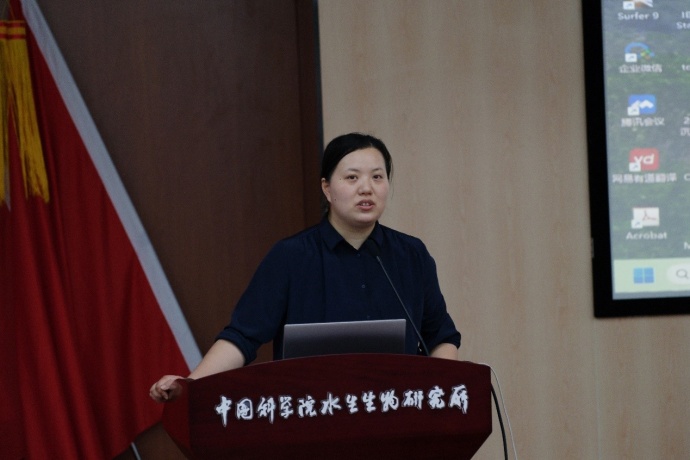
Deputy secretary-general LUO Qukan from the International Research Center on Karst under UNESCO delivered a speech (Credit: IHB)
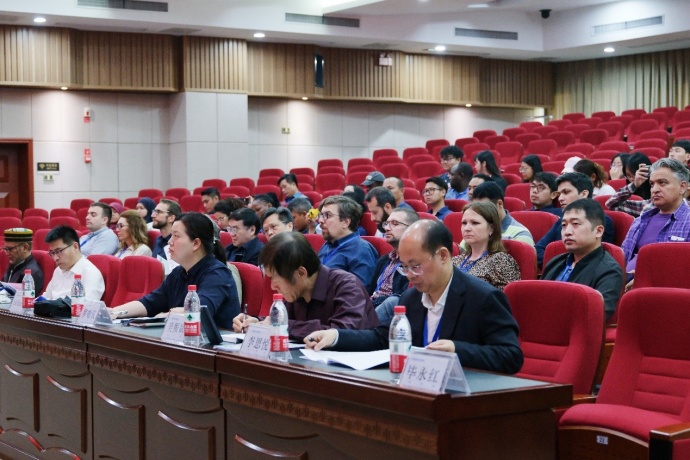
Opening ceremony site (Credit: IHB)
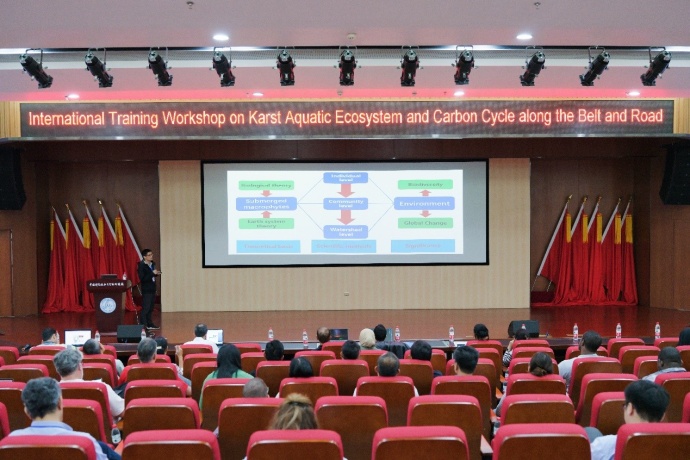
Training site (Credit: IHB)
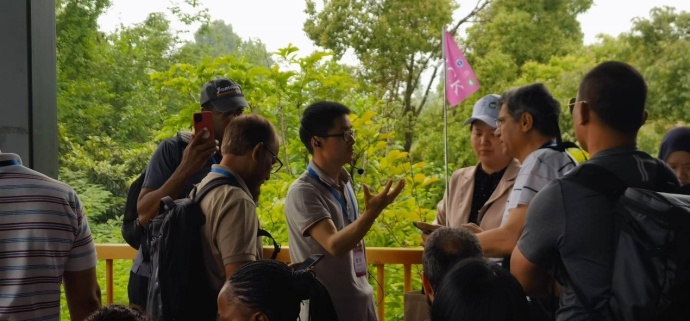
Field practice (Credit: IHB)
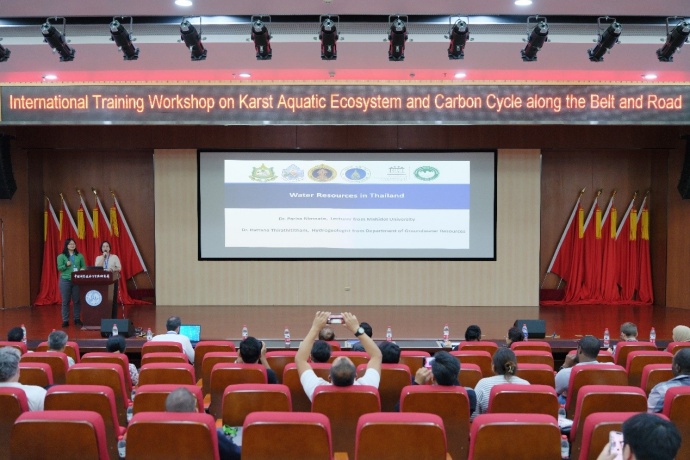
Students from Thailand share (Credit: IHB)